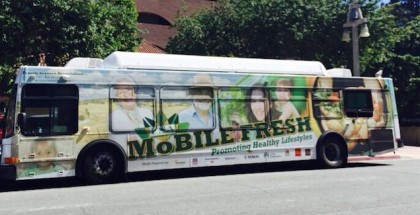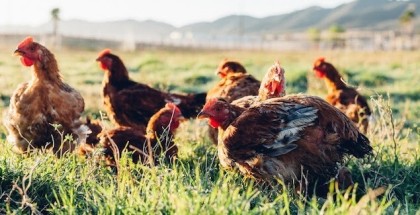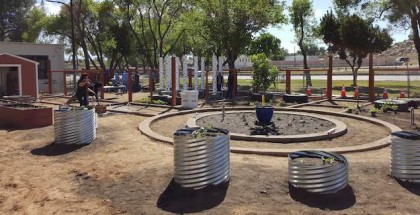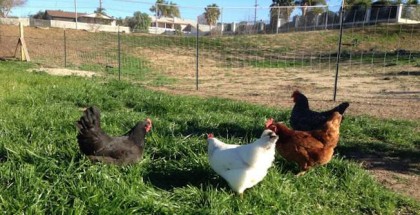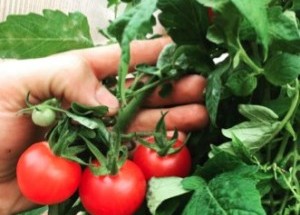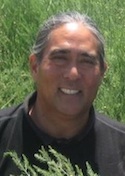Conference News
Grocery Store on Wheels Tackles Food Access Challenges in Riverside and San Bernardino
April 18, 2016 | Annamarie Sysling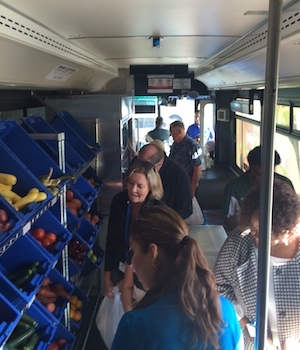
Mobile Fresh FSA customers shop for fresh and healthy food in Riverside. (Photo courtesy of Joey Romero, Program Director for Mobile Fresh FSA)
Increasing access to fresh and healthy food in “food deserts,” defined as low-income urban areas where a substantial number or share of residents has very limited access to a large grocery store or supermarket, requires creativity, resourcefulness and drive. And it is drive that resulted in the creation of a grocery store on wheels that enables Moreno Valley-based Family Service Assocation (FSA) to tackle trenchant food access problems in Riverside and San Bernardino, two of the largest counties in the United States.
Family Service Association (FSA), an organization that builds community “one family at a time, through compassion, advocacy and comprehensive model services, fostering self-sufficiency and sustainable impacts,” launched mobile fresh market pilot project, Mobile Fresh, in December 2013. Program Director Joey Romero says at the time, Mobile Fresh was run out of a van, and FSA advertised the new mobile grocery service at some of its offices and local child care and community centers. “We parked, put a table out there and put out some fresh fruits and vegetables,” recalls Romero. Read More
Amidst Changing Economic and Growing Climate Temecula’s Crows Pass Farm Adapts to Survive
April 13, 2016 | AJ Hughes
David and Tina Barnes are co-founders of Crows Pass Farm in Temecula. (photo courtesy Tina Barnes/Crows Pass Farm)
The ability to adapt is a necessary skill for survival in many arenas, especially in farming. David and Tina Barnes of Crows Pass Farm in Temecula, California know this truth from their own experience.
The farm was founded by the Barneses in 1991 and until recently produced a wide variety of crops including lemons, tangerines, oranges, strawberries, spinach and more.
To insure the economic sustainability of their farm, the Barneses initially employed a direct-to-restaurant business model and as recently as 2010, this approach led to success. At that time they were selling food directly to 45 eateries and business was booming.
Citing drought conditions, economic downturns, changing market conditions, an upcoming state minimum wage increase to $15 per hour, and the need to compete against produce growers who sell at a cheaper price, the Barneses made the decision to retrench and change the farm’s business model. Read More
Pasture-raised Livestock Operation in Murrieta, CA Finds Success by Getting People to the Farm
April 12, 2016 | AJ Hughes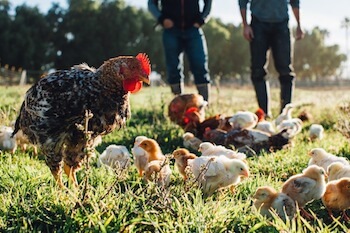
Murrieta, CA-based Primal Pastures is a family farm that sells pasture raised chicken, pork, lamb, beef, honey, and wild seafood. (Photo Credit: Kathi Bahr)
“We’re trying to take farming practices back 100 years, but put the business model 10 years ahead,” says farmer Paul Greive of Murrieta, CA-based Primal Pastures.
Greive and three of his in-laws founded Primal Pastures in 2012, starting with pastured free-range chickens. The small family farm has since expanded its offering and, in addition to poultry, now sells pasture raised pork, lamb, beef, honey, and wild seafood to its customers.
Primal Pastures is not an organic farm, but Greive takes pride in the fact that he and his fellow farmers employ regenerative and environmentally responsible farming practices that “go beyond sustainability.” Read More
City of Perris’s Cutting-edge Urban Community Garden to Tackle Growing Problems in Inland Empire
April 11, 2016 | Anne Craig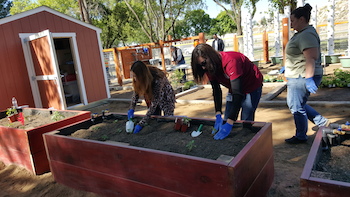
City workers, representatives of partner organizations Riverside County Department of Public Health and the Eastern Municipal Water District and elected officials gathered on March 31 to plant the first seeds at The Perris Green City Farm. Photo courtesy of the City of Perris.
In the City of Perris, CA located in Riverside County, the future of urban farming will soon be on full display. On April 23, the city will host an open house to introduce citizens to the Green City Farm Program, a state-of-the-art urban community garden initiative intended to provide a rich harvest of food, education and community building.
“The direction came from the Perris City Council and the community,” says project manager Isabel Carlos, Assistant Director of Administrative Services for the city. “What’s so cool about the vision is that it’s really a trendsetting urban demonstration project designed to address many of the problems we’re facing here in the Inland Empire. It’s built to facilitate small footprint growing and be extremely water efficient, while producing 50 percent faster growth and a higher yield.”
Techniques being incorporated into the community garden design include vertical and horizontal growing systems: hydroponic towers that employ water to irrigate roots, aeroponic towers that mist plant roots to facilitate growth, aquaponic towers that make use of nutrients from fish to fertilize the plants, as well as traditional raised garden beds. Read More
‘Beyond Organic’ Farm Emerges in Riverside’s Glen Valley to Seize Upon Local Food Opportunity
April 8, 2016 | AJ Hughes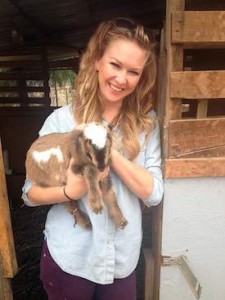
Kayla Causey is operator and owner of Sunny Cabana Farms in Riverside, CA where she raises goats and chickens. (photo courtesy Kayla Causey/Sunny Cabana Farms)
The story of Sunny Cabana Farms began when Cal State Fullerton lecturer Kayla Causey and her husband decided that they wanted more elbow room than their Orange County suburb could provide. So, in 2014 they moved to Riverside’s spacious Glen Valley area and began to lay the groundwork for a farm that would provide locally produced food and value added products to area residents.
Five chickens who already lived on the two-acre plot gave Causey a head start. Since then, Causey’s added dairy goats and Kunekune pigs (a heritage breed) as well as more chickens. An onsite orchard produces oranges, lemons, pomegranates, pears, grapefruit and apricots. Currently Causey milks seven dairy goats, which provide milk and kefir for her family. From the goat milk she also makes cheese and a variety of soaps and lotions.
Sunny Cabana Farms sells several of these items, but since it’s not a licensed grade A dairy, its milk and cheeses can’t legally be sold for human consumption. Read More
Local Food System Case Study: Control Air Community Farm Utilizes Aquaponics to Grow Food for Underserved
April 6, 2016 | OC Food Access On a small patch of land nestled in between a busy street, an elementary school, and a row of houses sits a quiet farm that is making big waves in Orange County sustainability. Inside the farm you’ll find rows of arugula, basil, and other crops in raised plant beds connected to tanks of tilapia. It also uses minimal water to operate and produces over 2,000 pounds of food for underserved residents. It’s the Control Air Community Farm in Anaheim, a project of Renewable Farms. It is an aquaponics farm, a farming system that combines elements of aquaculture and hydroponics and it just might be the future of sustainable agriculture. Read More
On a small patch of land nestled in between a busy street, an elementary school, and a row of houses sits a quiet farm that is making big waves in Orange County sustainability. Inside the farm you’ll find rows of arugula, basil, and other crops in raised plant beds connected to tanks of tilapia. It also uses minimal water to operate and produces over 2,000 pounds of food for underserved residents. It’s the Control Air Community Farm in Anaheim, a project of Renewable Farms. It is an aquaponics farm, a farming system that combines elements of aquaculture and hydroponics and it just might be the future of sustainable agriculture. Read More
Urban Farmer AG Kawamura Sees Local Food Marketplace and New Technology as Keys to Future of Agriculture
April 4, 2016 | AJ Hughes
A.G. Kawamura of Orange County Produce is the former Secretary of the California Department of Food and Agriculture. (photo courtesy A.G. Kawamura/OC Produce)
Urban farmer A.G. Kawamura is doing his part to preserve and foster the agricultural heritage in Irvine, California, a city of more than 250,000 in the heart of heavily-populated Orange County, just south of Los Angeles.
Kawamura, the former secretary of the California Department of Food and Agriculture, is in charge of field production at family-owned Orange County Produce. His grandparents immigrated to California from Japan in the early 1900s and began farming. Then, in 1958, his father moved the operation, then known as Western Marketing Company, to Orange County. In 1994, the family changed the company’s name to Orange County Produce because of their belief that Orange County still wants to participate in its agriculture heritage.
Because of its strategic location in Southern California, Kawamura believes Orange County Produce can make an impact throughout the region.
USDA Offers New Toolkit to Help Communities and Businesses Assess Economic Impact of Local Foods
March 28, 2016 | USDA USDA News Release — Agriculture Secretary Tom Vilsack today unveiled a new resource created by the U.S. Department of Agriculture (USDA) and Colorado State University that will help communities and businesses evaluate the economic benefits of investing in local food systems. The Secretary released details about “The Economics of Local Food Systems: A Toolkit to Guide Community Discussions, Assessments and Choices” in his keynote remarks at the 12th Annual Good Food Festival and Conference in Chicago. Read More
News Release — Agriculture Secretary Tom Vilsack today unveiled a new resource created by the U.S. Department of Agriculture (USDA) and Colorado State University that will help communities and businesses evaluate the economic benefits of investing in local food systems. The Secretary released details about “The Economics of Local Food Systems: A Toolkit to Guide Community Discussions, Assessments and Choices” in his keynote remarks at the 12th Annual Good Food Festival and Conference in Chicago. Read More

